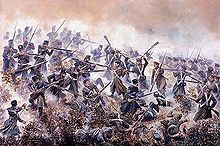Mark Walker (VC)
| Sir Mark Walker | |
|---|---|

Depiction of the battle of Inkerman
|
|
| Born |
27 November 1827 Finea, County Westmeath, Ireland |
| Died | 18 July 1902 (aged 74) Arlington Rectory, Devon, England |
| Buried at | Cheriton Road Cemetery, Folkestone |
| Allegiance | United Kingdom |
| Service/branch | British Army |
| Years of service | 1846–1893 |
| Rank | General |
| Unit |
30th Regiment of Foot 3rd Regiment of Foot |
| Battles/wars |
Crimean War Second Opium War |
| Awards |
Victoria Cross Knight Commander of the Order of the Bath Order of the Medjidie, 5th Class (Ottoman Empire) |
| Relations | Sir Samuel Walker, 1st Baronet |
| Other work | Honorary Colonel of the Sherwood Foresters |
General Sir Mark Walker VC, KCB (24 November 1827 – 18 July 1902) was a British Army officer and an Irish recipient of the Victoria Cross, the highest award for gallantry in the face of the enemy that can be awarded to British and Commonwealth forces.
Walker was born in Gore Port, Finea, County Westmeath in Ireland, the son of Captain Alexander Walker and Elizabeth Elliott. His brother was Sir Samuel Walker, 1st Baronet QC, Liberal MP for Londonderry, Solicitor-General for Ireland, Attorney-General for Ireland and Lord Chancellor of Ireland.
During the Crimean War, Walker was a 26-year-old lieutenant in the 30th Regiment of Foot (later the East Lancashire Regiment) British Army when the deed for which he was awarded the VC was performed.
On 5 November 1854 at Inkerman, Crimea, Lieutenant Walker jumped over a wall in the face of two battalions of Russian Infantry which were marching towards it. This act was to encourage the men, by example, to advance against such odds – which they did and succeeded in driving back both battalions.
His Victoria Cross was until recently on display at The Buffs Regimental Museum, Canterbury, England. With the rest of that museum's collections, it has now been transferred to the National Army Museum, where it is not currently on display.
...
Wikipedia
